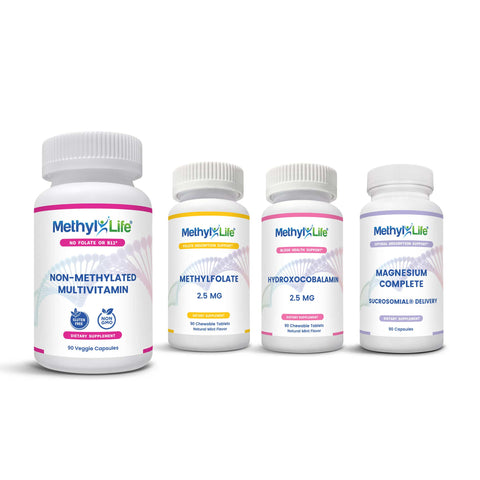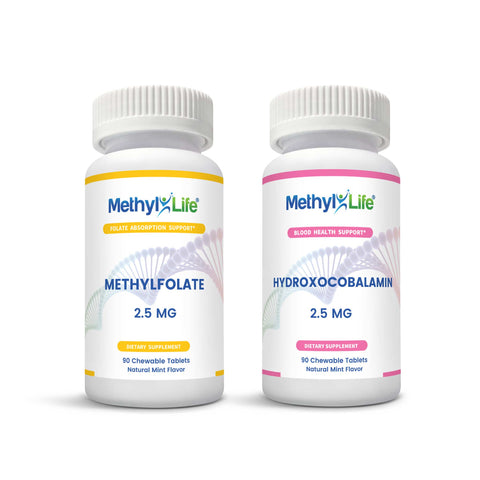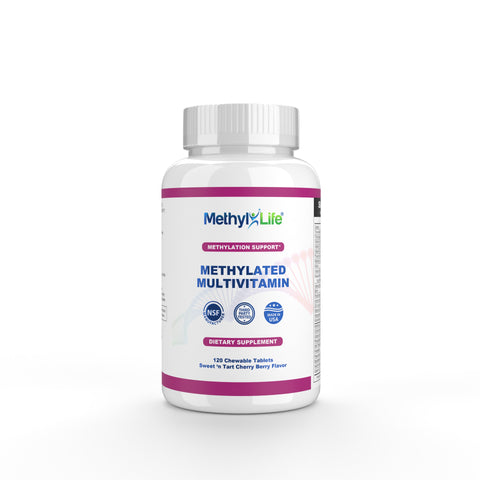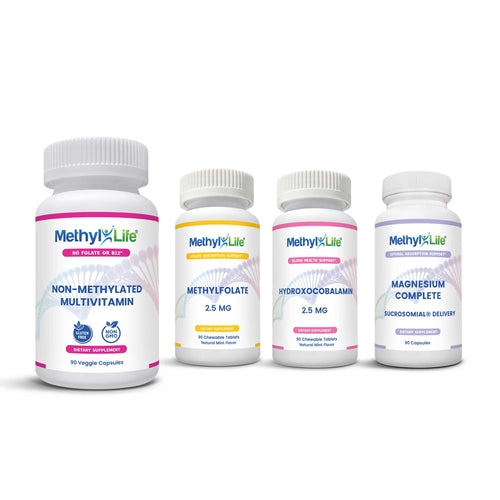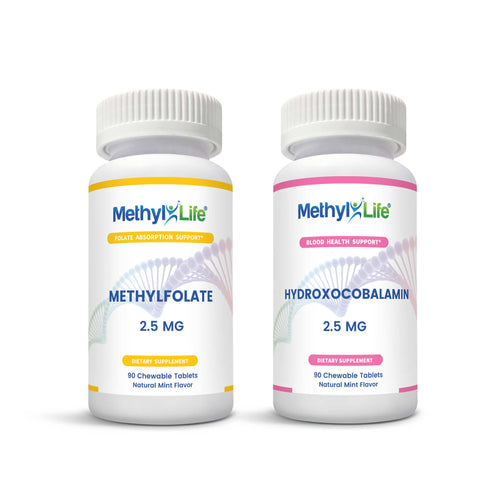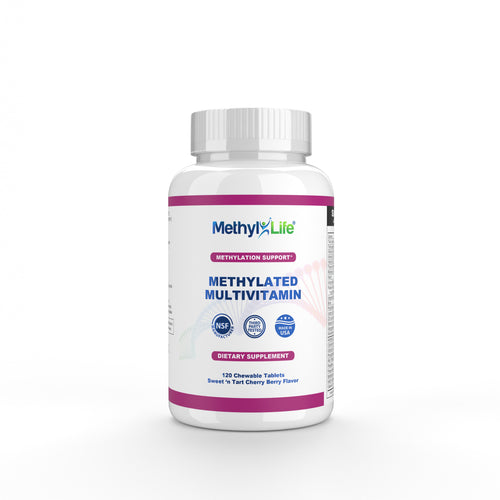
MTHFR Gene Mutation Treatment
How to treat MTHFR: Supplements, Diet, LifestyleProduct Recommendations
MTHFR Supplements
$125.00
- Fully Bioactive L-Methylfolate & Vitamin B12 Supplement
- Cofactors Supporting Methylation, Cognition & Wellbeing
- Superior-Absorbing Magnesium, Proven in Human Study
- 3rd-Party Tested for Purity & Safety, Non-GMO, Gluten-Free
Product Recommendations
MTHFR Actives
$58.00
- Easy Starting Dosage Levels for MTHFR Newbies
- Bioidentical L-Methylfolate for Immediate Absorption & Use
- Bioactive Vitamin B12 Sublingual, Hydroxy Form
- 3rd-Party Tested for Purity & Safety, Vegan & Non-GMO
Product Recommendations
Methylated Multivitamin
$42.00
- Methylfolate, Active B12, Energy-Supporting Nutrients
- Cognition-Aiding, Methylation-Promoting Ingredients
- 3rd-Party Tested for Purity, Potency & Safety
- Methylated Multivitamin Pack Upgrade Option
How to Manage MTHFR Through Diet
There is no specific one-size-fits-all treatment diet for MTHFR—but there are ways to support your health through diet and nutrition. The foods you eat and the supplements you take can play an important role in minimizing your risk of health issues associated with MTHFR.
Those with an MTHFR mutation are often low in natural folate, B12 and B6. These are key nutrients for the proper functioning of the methylation pathway. Impaired methylation can mean that a huge range of important molecules may not be efficiently produced. If this is the case, it’s important to mitigate its impact on your health.
Foods to Avoid with MTHFR
Those with MTHFR should avoid foods fortified with folic acid, the synthetic form of folate. The body is unable to properly convert folic acid into its active form, which can result in a buildup of folic acid in the body.2
Folic acid is added to many fortified breads, cereals, pasta, and other grain products. Check labels carefully. Reduce intake of inflammatory foods such as sugar, gluten, refined grains, dairy, trans fats, and processed snacks.
Supplements for MTHFR Mutation Treatment
It can be difficult to get the necessary amount of folate and other essential nutrients from food alone, so supplementation is often the most efficient way to restore a deficiency and support methylation. For those with MTHFR, L-methylfolate is the only way to bypass the MTHFR mutation and support healthy folate levels.
Clinical studies show that multivitamin supplementation with B vitamins can significantly reduce homocysteine levels among patients with hyperhomocysteinemia.3
These can be the most important B vitamins for someone with a MTHFR mutation.
NAC
N-acetylcysteine (NAC) is a powerful amino acid that increases glutathione, the body’s most important antioxidant. Taking NAC as a supplement has been shown to significantly lower homocysteine and other cardiovascular risk factors.4 NAC is also shown to help reduce oxidative stress and inflammation.5
A prescription medical food containing L-methylfolate, methylcobalamin, and N-acetyl-cysteine called Cerefolin®/CerefolinNAC® is specially formulated to address high homocysteine and oxidative stress in the brain, both of which have been associated with cognitive impairment. Cerefolin® has been shown to significantly slow brain atrophy and cognitive decline.6
According to Dr. Neil Rawlins, supplementing with NAC can be a good place to start your MTHFR treatment journey. NAC helps to increase levels of glutathione, the body’s most important antioxidant. Glutathione plays an important role in protecting cells from free radical damage and in detoxifying heavy metals and other pollutants.7
Most NAC supplements suggest a dosage of around 1,500 mg a day (but some folks may benefit from as much as 2-3 times that amount, depending upon their neurotransmission needs). Check the product dosage instructions carefully and consult your health professional before starting a supplement regime.
Dr. Rawlins suggests taking NAC for 1-2 weeks before beginning methylfolate (the ‘hero’ nutrient) discussed in step 3. Methylfolate will promote and utilize the intracellular glutathione, so it can be helpful to increase glutathione levels in advance. Starting with glutathione may result in being able to better tolerate methylfolate or allow you to take higher doses.
L-methylfolate
L-methylfolate is the primary active form of folate in your body required for the conversion of homocysteine into methionine. This is the precise enzyme form that the MTHFR gene makes, but when it is not working due to a mutation, the body can benefit from taking this nutrient form because it gets around the MTHFR gene defect. Taking folate 5-MTHF directly has been shown to significantly increase blood serum folate levels and reduce homocysteine levels.8 Methylfolate is also more effective than taking folic acid for lowering homocysteine.9
L-methylfolate is critical to the production of neurotransmitters that support normal mood and cognitive function. Studies show that taking methylfolate can help to reduce symptoms of depression, whether taken alone or alongside antidepressants.10
Folate 5-MTHF has been classified as a ‘medical food’ and is also available as a dietary supplement. However, some of the best methylfolate supplements for those with an MTHFR mutation(s) include Methyl-Life® products (Methylfolate 7.5+, Methylfolate 10, and Methylfolate 15).
Vitamin B12
B12 is involved in many critical bodily functions, including the making of red blood cells, neurotransmitter production, and nerve function.
Taking folate, B6 and B12 together has been shown to help lower homocysteine levels more significantly than taking folate alone.11 This is because all three vitamins play essential roles in the methylation of homocysteine to methionine.
Supplementation with a highly bioavailable form of vitamin B12 5,000 mcg such as hydroxy B12, methylcobalamin and/or adenosylcobalamin is the most efficient way to ensure optimal levels quickly. This is particularly important for vegans/vegetarians, the elderly, and anyone unable to absorb B12 efficiently.
Methyl-Life’s® B12 Complete is ideal for people with genetic mutations that may be affecting B12 absorption. B12 Complete contains a combination of the 3 most bioactive forms of B12 for maximum delivery and absorption, and can be used by the body’s cells immediately. This is a full-spectrum B12 product that is suitable for those with MTHFR, malabsorption disorders, vegans, vegetarians, and anyone else who has difficulty processing or obtaining B12.
Vitamin B6 (P5P)
Low B6 status can cause homocysteine to accumulate, while also reducing the availability of SAMe for methylation processes.12
The active form of vitamin B6 is known as pyridoxal-5-phosphate (P5P), which makes up around 70-80% of vitamin B6 in plasma. It serves as a cofactor for more than 150 enzymes in the body, including the metabolism of homocysteine and tryptophan.
Some research has suggested that clearance of P5P decreases with B6 supplementation, indicating that B6 status affects the rate at which P5P is removed from the body.13 Vitamin B6 toxicity symptoms can mimic vitamin B6 deficiency, which is usually peripheral sensory neuropathy.14 Pay attention to your body’s reaction when you add a new nutrient into your routine and consult your healthcare professional if you experience any symptoms.
Omega 3 fish oil
This essential fatty acid has been shown to help reduce homocysteine levels by increasing the amount of active MTHFR reductase enzymes, supporting cognitive and cardiovascular function.15 Omega-3 travels easily through the blood-brain barrier to interact with mood-related molecules in the brain, and harbors powerful anti-inflammatory benefits.
Trimethylglycine (TMG) Betaine
In the methionine cycle, homocysteine is turned into methionine with the help of an enzyme called betaine homocysteine methyltransferase (BHMT). This process is separate from the one that uses vitamin B12 or folate.
In this process, a molecule called trimethylglycine (TMG) donates a methyl group to homocysteine, turning it into methionine. When TMG gives up its methyl group, it becomes dimethylglycine (DMG). The enzyme BHMT, which contains zinc, makes this process happen using the methyl groups from TMG, which comes from food or from the breakdown of choline.16 TMG can therefore be an important methylating agent when the folate pathway is impaired.
Glutathione
Glutathione is the body’s most potent antioxidant, required for detoxifying free radicals and maintaining healthy balance within cells. Low levels of glutathione are associated with many pathological conditions, such as arthritis, cardiovascular and neurodegenerative diseases, and diabetes.17
Homocysteine is converted to cystathionine and cysteine in the transsulfuration pathway. Cysteine is then used to produce glutathione, regenerating antioxidant levels to combat damage by reactive oxygen species. Poor homocysteine metabolism may mean that glutathione synthesis is reduced, leading to an increase in oxidative stress.
Taurine
Taurine is a non-essential sulfur-containing amino acid and antioxidant that functions in digestion (as part of bile), maintaining fluid balance, and aiding in calcium signaling. It is essential for proper heart, muscle, nerve, and eye function. Taurine has been shown to help to reduce high homocysteine levels and protect the heart and vascular cells.18
Magnesium
Alongside the B vitamins, magnesium is vital in supporting a healthy mood, cardiovascular function, and nerve function. Magnesium levels can impact central nervous system function, as it plays a role in DNA replication. Magnesium also has important antidepressant and neuroprotective effects.19
Medications that can reduce the absorption of B vitamins
Always consult with your health professional before stopping any medications or starting any new supplements.
This is not an exhaustive list:
Lifestyle changes
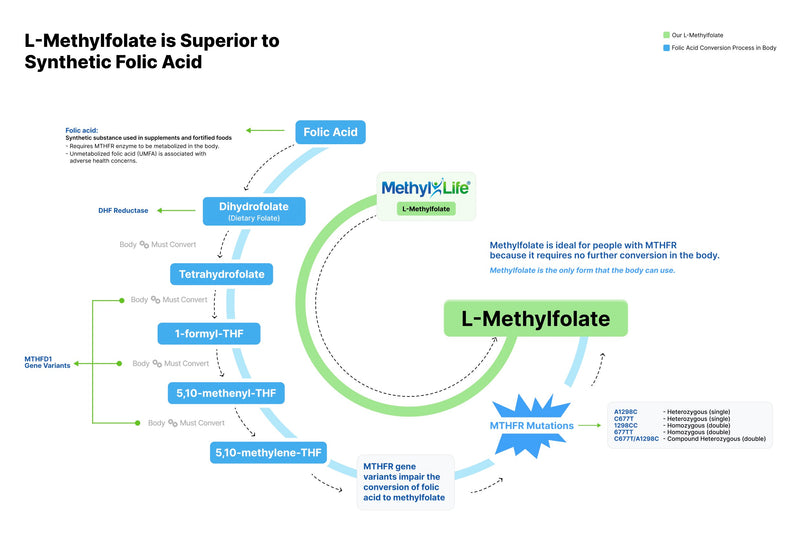

Frequently Asked Questions about MTHFR treatment
If you are simply looking to support your health, you can treat MTHFR naturally with a healthy diet and supplements such as methylfolate and vitamin B12.
Other recommendations include nutrients that assist with healthy methylation, including bioactive vitamin forms of B6 and B12.
Dietary recommendations for optimizing methylation
Increase your dietary intake of folate
Dietary folate is NOT the same as folic acid tablets. Folate is the natural form of the vitamin as it occurs in food, while folic acid is a synthetic form. The bioavailability of L-Methylfolate is much higher than folic acid.1
Eating a wide range of whole foods is a good way to support healthy methylation. Fresh fruits and vegetables contain the B vitamins and other nutrients required for the methylation process. Your diet should include plenty of dark leafy greens, asparagus, avocado, broccoli, brightly colored fruits and fruit juices, as well as nuts, legumes (beans, peas), seafood, eggs, dairy products, beef, poultry, fish, and grains.
Increase your dietary intake of vitamin B12
Vitamin B12 works alongside methylfolate in the methylation process. Much of the population is low or deficient in vitamin B12, which can impair your methylation further. Food sources of B12 include animal products such as fish, meat, poultry, eggs, milk, and milk products.
For vegans and vegetarians, supplementing with B12 is a must as they will not be obtaining B12 from their diet. Hydroxy B12 and B12 Complete are two vegan options that provide highly bioavailable sources of B12.
Support gut health for optimal nutrient absorption
A healthy gut microbiome will support your body’s ability to obtain nutrients from food, which in turn will support your overall health and wellbeing.
Promote the health of your gut bacteria by eating fermented foods such as kimchi, kefir, miso, and kombucha. These contain natural probiotics that aid in digestion. Reduce intake of inflammatory foods such as sugar, gluten, refined grains, trans fats, and processed snacks.
Avoid gluten-containing foods where possible. Those with gluten sensitivity and MTHFR can suffer a double blow as the symptoms of both can amplify one another. Gluten is also a major cause of inflammation in the gut lining.
Eat more healthy fats, especially N-butyrate. This is a short-chain fatty acid that nourishes the cells lining the gut. N-butyrate occurs naturally in ghee and coconut oil. Other gut-healing foods include bone broth, flaxseeds, chia seeds, and turmeric. For symptoms such as gas and bloating, try drinking tea made with ginger, chamomile, or peppermint.
Remember, if you are struggling with chronic gastrointestinal symptoms such as bloating, gas, or indigestion, it may be a good idea to seek the advice of a naturopath or nutritionist.
Other dietary recommendations
Increase your fiber intake to 30-50 grams per day to support healthy gut motility and microbiome
Drink at least 2 liters of pure, filtered water per day
Eat plenty of anti-inflammatory foods: brightly colored fruits and vegetables, high-quality protein, healthy fats.
Avoid or limit all refined sugars
Sample Meal Plan for MTHFR
Breakfast:
Natural Greek yogurt (B12 per 100 g: 0.75 mcg)
Raw walnuts (7% RDA folate)
Plain Greek yogurt provides vitamin B-12, calcium, and vitamin D. It’s also a valuable source of probiotics, which can help to support gastrointestinal health.
Lunch:
Salmon (Red/sockeye), filets with skin. (B6 per 100 g: 0.9 mg, B12 per 100 g: 18.1 mcg)
Salad with raw spinach (49% RDA) and avocado (20% RDA folate)
Salmon is rich in B6 and protein, and is one of the best oily-fish sources of Omega 3.
Dinner:
Lean beef (B6 per 100 g: 0.5 mg, B12 per 100 g: 2.6 mcg)
Beans/lentils (~50% RDA folate)
Broccoli (27% RDA folate)
Olive oil (Moroccan olive oil is highly recommended for its high hydroxytyrosol content)
Lean beef is an excellent source of protein, iron, Vitamin B12, zinc, selenium, niacin, and phosphorus.
Support detoxification pathways
Get active by exercising at least five days a week for 30 minutes a day. Exercise boosts circulation and digestive function, assisting with elimination. Exercise also reduces homocysteine levels in the body and helps to manage healthy weight.20
Attend regular sauna treatments and take Epsom salt baths.
Avoid or limit exposure to toxins such as artificial additives in food, BPAs, heavy metals and chemical house cleaners. These can impair methylation further.
Reduce or limit alcohol intake.
Minimize stress levels
It’s impossible to avoid stress completely, but there are many ways to reduce the impact of stress on your body.
Learn to meditate and engage in regular meditation practice every day
Exercise at least five times a week. Numerous studies show that exercise reduces cortisol, the ‘stress’ hormone.22
Start journaling.
Try forest bathing.
Avoid situations, people, and environments that you know stress you out.
Product Recommendations
MTHFR Supplements: L-Methylfolate, Vitamin B12 Supplement, Multivitamin & Magnesium
$125.00
- Fully Bioactive L-Methylfolate & Vitamin B12 Supplement
- Cofactors Supporting Methylation, Cognition & Wellbeing
- Superior-Absorbing Magnesium, Proven in Human Study
- 3rd-Party Tested for Purity & Safety, Non-GMO, Gluten-Free
Product Recommendations
MTHFR Actives - L-Methylfolate + Hydroxy B12 Sublingual
$58.00
- Easy Starting Dosage Levels for MTHFR Newbies
- Bioidentical L-Methylfolate for Immediate Absorption & Use
- Bioactive Vitamin B12 Sublingual, Hydroxy Form
- 3rd-Party Tested for Purity & Safety, Vegan & Non-GMO
Product Recommendations
Chewable Methylated Multivitamin - L-Methylfolate + Active B12 - MTHFR/Pregnancy/Children
$42.00
- Methylfolate, Active B12, Energy-Supporting Nutrients
- Cognition-Aiding, Methylation-Promoting Ingredients
- 3rd-Party Tested for Purity, Potency & Safety
- Methylated Multivitamin Pack Upgrade Option

Written By:
Katie Stone - Naturopath
Medical Reviewer:
Kari Asadorian - BSN, RN
Edited By:
Jamie Hope - Methyl-Life® FounderReferences
-
Lorena Carboni; "Active Folate Versus Folic Acid: The Role of 5-MTHF (Methylfolate) in Human Health"; Integrative medicine; 2022 Jul
https://www.ncbi.nlm.nih.gov/pmc/articles/PMC9380836/
-
Ping Chen, Linlin Tang, Yun Song, Binyan Wang, Xianhui Qin, Nan Zhang, Yaping Wei, Xiping Xu, Ziyi Zhou, Qiangqiang He, Lishun Liu, Sultan Mehmood Siddiqi, Xiao Huang, Xiaoshu Cheng, Genfu Tang, Yong Duan, Houqing Zhou, Jie Jiang, Sha Li; "Association of folic acid dosage with circulating unmetabolized folic acid in Chinese adults with H-type hypertension: a multicenter, double-blind, randomized controlled trial"; Frontiers in nutrition; 2023 Sep
https://www.ncbi.nlm.nih.gov/pmc/articles/PMC10538967/
-
Koutatsu Maruyama, Ehab S Eshak, Minako Kinuta, Masanori Nagao, Renzhe Cui, Hironori Imano, Tetsuya Ohira, Hiroyasu Iso; "Association between vitamin B group supplementation with changes in % flow-mediated dilatation and plasma homocysteine levels: a randomized controlled trial"; Journal of clinical biochemistry and nutrition; 2019 Mar
https://www.ncbi.nlm.nih.gov/pmc/articles/PMC6529698/
-
Sławomir Kasperczyk, Michał Dobrakowski, Aleksandra Kasperczyk, Ewa Romuk, Monika Rykaczewska-Czerwińska, Natalia Pawlas, Ewa Birkner; "Effect of N-acetylcysteine administration on homocysteine level, oxidative damage to proteins, and levels of iron (Fe) and Fe-related proteins in lead-exposed workers"; Toxicology and industrial health; 2016 Sep
https://pubmed.ncbi.nlm.nih.gov/25731901/
-
Federico Cacciapuoti; "N-Acetyl-Cysteine supplementation lowers high homocysteine plasma levels and increases Glutathione synthesis in the trans-sulfuration pathway"; Italian Journal of Medicine; 2019
https://www.italjmed.org/ijm/article/view/itjm.2019.1192
-
William R. Shankle, Junko Hara, Lori W. Barrentine, Melanie V. Curole; "CerefolinNAC Therapy of Hyperhomocysteinemia Delays Cortical and White Matter Atrophy in Alzheimer’s Disease and Cerebrovascular Disease"; Journal of Alzheimer’s Disease; 2016 Aug
https://content.iospress.com/articles/journal-of-alzheimers-disease/jad160241
-
Marijke Jozefczak, Tony Remans, Jaco Vangronsveld, Ann Cuypers; "Glutathione Is a Key Player in Metal-Induced Oxidative Stress Defenses"; International journal of molecular sciences; 2012 Mar
https://pmc.ncbi.nlm.nih.gov/articles/PMC3317707/
-
Evgeny Pokushalov, Andrey Ponomarenko, Sevda Bayramova, Claire Garcia, Inessa Pak, Evgenya Shrainer, Marina Ermolaeva, Dmitry Kudlay, Michael Johnson, Richard Miller; "Effect of Methylfolate, Pyridoxal-5′-Phosphate, and Methylcobalamin (SolowaysTM) Supplementation on Homocysteine and Low-Density Lipoprotein Cholesterol Levels in Patients with Methylenetetrahydrofolate Reductase, Methionine Synthase, and Methionine Synthase Reductase Polymorphisms: A Randomized Controlled Trial"; Nutrients; 2024 May
https://www.ncbi.nlm.nih.gov/pmc/articles/PMC11173557
-
Lorena Carboni; "Active Folate Versus Folic Acid: The Role of 5-MTHF (Methylfolate) in Human Health"; Integrative medicine; 2022 Jul
https://www.ncbi.nlm.nih.gov/pmc/articles/PMC9380836/
-
Richard C Shelton, J Sloan Manning, Lori W Barrentine, Eleanor V Tipa; "Assessing Effects of l-Methylfolate in Depression Management: Results of a Real-World Patient Experience Trial"; The primary care companion for CNS disorders; 2013 Aug
https://www.ncbi.nlm.nih.gov/pmc/articles/PMC3869616/
-
Danielius Serapinas, Evelina Boreikaite, Agne Bartkeviciute, Rita Bandzeviciene, Mindaugas Silkunas, Daiva Bartkeviciene; "The importance of folate, vitamins B6 and B12 for the lowering of homocysteine concentrations for patients with recurrent pregnancy loss and MTHFR mutations"; Reproductive Toxicology; 2017 Sep
https://www.sciencedirect.com/science/article/abs/pii/S0890623817301417
-
Zorislava Bajic, Tanja Sobot, Ranko Skrbic, Milos P Stojiljkovic, Nenad Ponorac, Amela Matavulj, Dragan M Djuric; "Homocysteine, Vitamins B6 and Folic Acid in Experimental Models of Myocardial Infarction and Heart Failure—How Strong Is That Link?"; Biomolecules; 2022 Apr
https://www.ncbi.nlm.nih.gov/pmc/articles/PMC9027107/
-
A Lui, L Lumeng, G R Aronoff, T K Li; "Relationship between body store of vitamin B6 and plasma pyridoxal-P clearance: metabolic balance studies in humans"; The Journal of laboratory and clinical medicine; 1985 Nov
https://pubmed.ncbi.nlm.nih.gov/4056565/
-
Adam Hemminger, Brandon K. Wills; "Vitamin B6 Toxicity"; StatPearls [Internet]; 2023 Feb
https://www.ncbi.nlm.nih.gov/books/NBK554500/
-
Mohammad Hassan Sohouli, Mehdi Mehdinezhad Roshan, Olowoselu F Olusola, Somaye Fatahi, Hamid Reza Omidi, Parastoo Sharifi, Azita Hekmatdoost, Emad Kutbi, Ahmed Abu-Zaid; "Impact of Omega-3 supplementation on homocysteine levels in humans: A systematic review and meta-regression analysis of randomized controlled trials"; Nutrition, metabolism, and cardiovascular diseases: NMCD.; 2022 Sep
https://pubmed.ncbi.nlm.nih.gov/35843792/
-
ScienceDirect; "Dimethylglycine"; ScienceDirect.com
https://www.sciencedirect.com/topics/pharmacology-toxicology-and-pharmaceutical-science/dimethylglycine
-
Danyelle M Townsend, Kenneth D Tew, Haim Tapiero; "The importance of glutathione in human disease"; Biomedicine & pharmacotherapy = Biomédecine & pharmacothérapie; 2003 May-Jun
https://pubmed.ncbi.nlm.nih.gov/12818476/
-
Anthony Zulli, Eza Lau, Bagus P P Wijaya, Xin Jin, Komang Sutarga, Grace D Schwartz, Jonathon Learmont, Peter J Wookey, Angelo Zinellu, Ciriaco Carru, David L Hare; "High dietary taurine reduces apoptosis and atherosclerosis in the left main coronary artery: association with reduced CCAAT/enhancer binding protein homologous protein and total plasma homocysteine but not lipidemia"; Hypertension; 2009 Jun
https://pubmed.ncbi.nlm.nih.gov/19398656/
-
Cara T Hoepner, Roger S McIntyre, George I Papakostas; "Impact of Supplementation and Nutritional Interventions on Pathogenic Processes of Mood Disorders: A Review of the Evidence"; Nutrients; 2021 Feb
https://www.ncbi.nlm.nih.gov/pmc/articles/PMC7996954/
-
Hamid Reza Mohammadi, Ebrahim Khoshnam, Maryam Koshki Jahromi, Mohammad Sadegh Khoshnam, Elham Karampour; "The Effect of 12-Week of Aerobic Training on Homocysteine, Lipoprotein A and Lipid Profile Levels in Sedentary Middle-aged Men"; International journal of preventive medicine; 2014 Aug
https://www.ncbi.nlm.nih.gov/pmc/articles/PMC4258664/
-
Karen M Jiménez, Angela J Pereira-Morales, Diego A Forero; "MTHFR gene methylation is associated with perceived stress in healthy young adults"; Psychiatric genetics.; 2018 Jun
https://pubmed.ncbi.nlm.nih.gov/29595559/
-
Len De Nys, Kerry Anderson, Esther F Ofosu, Gemma C Ryde, Jenni Connelly, Anna C Whittaker; "The effects of physical activity on cortisol and sleep: A systematic review and meta-analysis"; Psychoneuroendocrinology; 2022 Sep
https://pubmed.ncbi.nlm.nih.gov/35777076/
Table of Contents
Product Recommendations
MTHFR Supplements: L-Methylfolate, Vitamin B12 Supplement, Multivitamin & Magnesium
$125.00
MTHFR Actives - L-Methylfolate + Hydroxy B12 Sublingual
$58.00
Chewable Methylated Multivitamin - L-Methylfolate + Active B12 - MTHFR/Pregnancy/Children
$42.00

